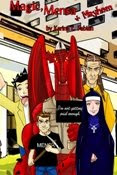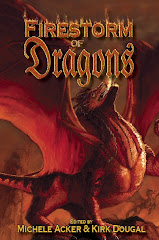
When Sisko refuses the demon Beltrid's request to use his miracle-producing ring for selfish purposes, Sisko's world is turned upside down. Trapping Sisko's wife, Gabrielle, inside the "Crystal of Virtues," Beltrid sends Sisko and his two teenage children, Nathan and Kaylee, on a journey to find seven virtues that will free her. Simple? Not when a demon is involved. The trip takes several twists and turns leading to a showdown at the steam house where it all started. They discover that the reality of the ring transcends healing sicknesses—they discover a transforming reality.
This book is the second book in the Reality Series, the first being
Infinite Realities.
Order author-signed copies of either book at: http://store.rlcopple.com
You can also purchase the e-book of Transforming Realities in pdf, pdb, epub, or mobi.
Want a Free Book? The ebook version of
Infinite Realities, the first book, a novella, is available for free
from his site. Rick says, "It is an easy read that will not only ground one in Sisko's world and story, but give one a taste for my writing style so you'll know whether you want to spend the bucks on Transforming Realities. I'd encourage folks to take advantage of it if they like original fantasy."
Interview with R. L. Copple:1. Why did you write this book?
Pretty much why I write most stories. To tell a great story that will
capture people's imaginations, and to help others see perspectives that
they may not have seen before through new eyes. I think fantasy lends
itself well to those goals, and what I hope this novel has accomplished.
2. What was hardest to write about this book?
The hardest was the climax chapter. To tell you why would mean I have to
initiate a memory wipe right afterwards on you. Wouldn't want to give
away any spoilers. But I'll just say it made me cry. Even the first few
times going back over it to edit the chapter. Those who have read it
will know what I'm talking about. I don't expect everyone to have the
same reaction; I guess I'm sentimental that way.
To point to another take on this question, however, one of the more
difficult pitfalls to avoid since this series has a "magical ring" as
part of the story, was to avoid events and characters that felt as if I
were copying Lord of the Rings. More than once I would reject an idea
for something to happen because it had already been done to death or
would sound like something out of LOTR. That said, I do have one
not-hard-to-spot nod to the LOTR story in the book. But I did my best to
avoid having it feel like a LOTRs copycat story. And by the reactions
I've received to date, I'd say I succeeded. But it wasn't always easy to
avoid.
3. What did you enjoy writing the most?
There are several scenes that I enjoyed writing. What I like about any
story is when a scene comes together, and all the right pieces fall into
place that make it work on several levels. Sometimes that happens when
I'm writing the first draft. Other times it happens when I'm editing it
or when a critique partner points out something that leads my thoughts
into a different area I hadn't thought of before.
But when it works, I love it. Not only do I find a good scene that I
think people will enjoy reading, but it is natural to the characters and
the book's theme/story movement.
One particular scene I enjoyed happened on an edit when it was pointed
out to me that it didn't work, and I realized it was because even though
a lot of threats were happening, the characters never had to struggle to
avoid them. It then dawned on me that this scene with fire could fit
into the whole Realities theme and story arch, and I ended up writing my
first song in that chapter. One of the more ho hum chapters in the books
ended up becoming one of my favorites, and one I think will stand out in
reader's minds.
4. What do you hope folks will get from this book?
As far as specific lessons or morals, I'd rather allow the reader to see
those in the story themselves than to tell them what I want them to get
out of it. I've seen a few interpretations on my first book that I
didn't have in mind when I wrote it, but the reader sees it. A good
story will be like that, and so I wouldn't want to freeze the "lesson"
in place for folks, but allow God to use it with the individual as He
sees fit.
But, like I said above, I do hope that it will make them think about
their own faith, whether Christian or non-Christian, and look at things
from a fresh perspective. I titled it Transforming Realities because in
the end, it is exposure to God's reality that can transform our lives
for the better. So I pray that I've been able to give folks a taste of
that even within a fictional story that they will enjoy reading.
5. What's next for you?
I'm currently editing the third and final book of the Reality series,
and I fully believe I've been able to write a book that will top
Transforming Realities. These books follow the ring's journey, and I
love the ending I've devised for how the series ends, and a lot of fun
stuff happens on their way to that glorious event. Unfortunately it will
be next year sometime before I can share that with all but a few crit
partners. Such is the writer's life.
I also have a space opera novel that I'm getting ready to shop for a
publisher/agent. And I have one space opera novel I want to rewrite in
the future, as well as outlines/beginnings for about four other novels.
And on the side I keep writing short stories and flashes when I'm able.
So, I've plenty to keep me busy.
Learn more about Copple at
http://www.rlcopple.com















